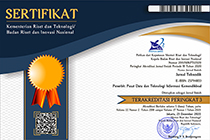Increaseing Students’ Engagement in Learning through Mentimeter Platform
DOI:
https://doi.org/10.32550/teknodik.vi.1071Keywords:
students’ engagement, meaningful learning, Mentimeter platformAbstract
The presence of various technologies in education can create a condition in which learning process can take place more effectively and meaningfully. The use of various online learning platforms in class is often a strategy for educators to increase students’ interaction and engagement during the learning. In fact, there are still many educators who don't know how to start and utilize the platform in learning. This study aims to redefine best practices that can be used by educators when using Mentimeter platform in learning. The descriptive method is used in this study by involving 40 students who attended lecture activities with Mentimeter platform. The result shows that Mentimeter platform can be used to increase students’ engagement and interaction in the learning process. This can be seen from the number of responses given by the respondents compared to conventional learning activities that do not involve technology in the process. In addition, Mentimeter platform can be a tool for conducting simple formative assessments for educators. Future studies need to present an experimental activity that tests the existence of this Mentimeter platform in learning further.
References
Alyoussef, I. Y. (2023). Acceptance of e-learning in Higher Education: The Role of Task-technology Fit with the Information Systems Success Model. Heliyon, 9(3), e13751. https://doi.org/10.1016/j.heliyon.2023.e13751
Antonietti, C., Schmitz, M.-L., Consoli, T., Cattaneo, A., Gonon, P., & Petko, D. (2023). “Development and Validation of the ICAP Technology Scale to Measure How Teachers Integrate Technology into Learning Activities.” Computers & Education, 192, 104648. https://doi.org/10.1016/j.compedu.2022.104648
Ardiansyah, A., & Sari, H. F. A. (2023). Ketertarikan, Perhatian, Perasaan Senang, dan Keterlibatan Mahasiswa dalam Menggunakan Chatbot Akuntansi. Jurnal Teknodik, 27(1), 33–50.
Atabek, O. (2020). Associations Between Emotional States, Self-Efficacy for and Attitude Towards Using Educational Technology. International Journal of Progressive Education, 16(2), 175–194. https://doi.org/10.29329/ijpe.2020.241.12
Brauchli, C., Leipold, S., & Jäncke, L. (2020). Diminished Large-scale Functional Brain Ntworks in Absolute Pitch during the Perception of Naturalistic Music and Audiobooks. Neuro Image, 216, 116513. https://doi.org/10.1016/j.neuroimage.2019.116513
Bulman, G., & Fairlie, R. W. (2016). Technology and Education. In Handbook of the Economics of Education (Vol. 5, pp. 239–280). Elsevier. https://doi.org/10.1016/B978-0-444-63459-7.00005-1
Creswell, J. W., & Creswell, J. D. (2018). Research Design: Qualitative, Quantitative, and Mixed Methods Approaches (Fifth Edition). Sage Publications.
Degirmenci, R. (2021). The Use of Quizizz in Language Learning and Teaching from the Teachers’ and Students’ Perspectives: A Literature Review. Language Education and Technology, 1(1).
Hanatan, R. B., Yuniastuti, E., & Prayitno, B. A. (2023). Pengembangan Modul Digital Interaktif Berbasis Discovery Learning untuk Meningkatkan Minat Belajar Siswa. Jurnal TEKNODIK, 27(1), 81–98.
Hasyyati, H., & Zulherman, Z. (2021). Pengembangan Media Evaluasi Menggunakan Mentimeter untuk Meningkatkan Keaktifan Siswa pada Pembelajaran Daring. Jurnal Basicedu, 5(4), 2550–2562. https://doi.org/10.31004/basicedu.v5i4.1246
Herlawati, H., Khasanah, F. N., & Sari, R. (2021). Pelatihan Mentimeter sebagai Media Interaksi dalam Pembelajaran Daring pada SMAN 14 Bekasi. Journal of Computer Science Contributions, 1(1), 42–52.
Lusiani, L. (2021). Penggunaan Aplikasi Mentimeter sebagai Upaya Motivasi Belajar Taruna Teknika pada Materi Mekanika Terapan. Jurnal Penelitian Pembelajaran Fisika, 12(2), 151–158. https://doi.org/10.26877/jp2f.v12i2.8338
Mao, J. (2014). Social media for learning: A Mixed Methods Study on High School Students’ Technology Affordances and Perspectives. Computers in Human Behavior, 33, 213–223. https://doi.org/10.1016/j.chb.2014.01.002
Mirayani, N. N., Yasa, I. N., & Sudiana, I. N. (2022). Efektivitas Mentimeter sebagai Media Pembelajaran Interaktif di Kelas X IBB 1 SMAN 1 Kintamani. Jurnal Penelitian Mahasiswa Indonesia, 2(2).
Mohin, M., Kunzwa, L., & Patel, S. (2022). Using Mentimeter to Enhance Learning and Teaching in a Large Class. International Journal of Educational Policy Research and Review, 9(2), 48–57. https://doi.org/10.15739/IJEPRR.22.005
Moorhouse, B. L., & Kohnke, L. (2020). Using Mentimeter to Elicit Student Responses in the EAP/ESP Classroom. RELC Journal, 51(1), 198–204. https://doi.org/10.1177/0033688219890350
Pichardo, J. I., López-Medina, E. F., Mancha-Cáceres, O., González-Enríquez, I., Hernández-Melián, A., Blázquez-Rodríguez, M., Jiménez, V., Logares, M., Carabantes-Alarcon, D., Ramos-Toro, M., Isorna, E., Cornejo-Valle, M., & Borrás-Gené, O. (2021). Students and Teachers Using Mentimeter: Technological Innovation to Face the Challenges of the COVID-19 Pandemic and Post-Pandemic in Higher Education. Education Sciences, 11(11), 667. https://doi.org/10.3390/educsci11110667
Plass, J. L., & Kaplan, U. (2016). Emotional Design in Digital Media for Learning. In Emotions, Technology, Design, and Learning (pp. 131–161). Elsevier. https://doi.org/10.1016/B978-0-12-801856-9.00007-4
Skoyles, A., & Bloxsidge, E. (2017). Have You Voted? Teaching OSCOLA with Mentimeter. Legal Information Management, 17(4), 232–238. https://doi.org/10.1017/S1472669617000457
Starcic, I. A., & Bagon, S. (2014). ICT-Supported Learning for Inclusion of People with Special Needs: Review of Seven Educational Technology Journals, 1970-2011: ICT-supported Learning for Special Needs. British Journal of Educational Technology, 45(2), 202–230. https://doi.org/10.1111/bjet.12086
Tabuenca, B., Moreno-Sancho, J.-L., Arquero-Gallego, J., Greller, W., & Hernández-Leo, D. (2023). Generating an Environmental Awareness System for Learning Using IoT Technology. Internet of Things, 22, 100756. https://doi.org/10.1016/j.iot.2023.100756
Tarazi, A., & Ortega-Martín, J. L. (2023). Enhancing EFL Students’ Engagement in Online Synchronous Classes: The Role of the Mentimeter Platform. Frontiers in Psychology, 14, 1127520. https://doi.org/10.3389/fpsyg.2023.1127520
Vallely, K. S. A., & Gibson, P. (2018). Engaging Students on Their Devices with Mentimeter. Compass: Journal of Learning and Teaching, 11(2). https://doi.org/10.21100/compass.v11i2.843
Voogt, J., Erstad, O., Dede, C., & Mishra, P. (2013). Challenges to Learning and Schooling in the Digital Networked World of the 21st Century: Learning and Schooling in a Digital World. Journal of Computer Assisted Learning, 29(5), 403–413. https://doi.org/10.1111/jcal.12029
Warsihna, J., & Ramdani, Z. (2020). Signifikansi Kahoot!: Interaksi Manusia dan Mesin dalam Proses Pembelajaran. Kwangsan: Jurnal Teknologi Pendidikan, 8(2), 154. https://doi.org/10.31800/jtp.kw.v8n2.p154--167
Warsihna, J., Ramdani, Z., & Prakoso, B. H. (2019). Using Kahoot to Improve Students’ Achievement and Critical Thinking in Undergraduate of Psychology Students. Proceedings of the 16th International Conference on Cognition and Exploratory Learning in Digital Age (CELDA 2019), 144–150. https://doi.org/10.33965/celda2019_201911L018
Wong, P. M., & Yunus, M. M. (2020). Enhancing Writing Vocabulary Using Mentimeter. International Journal of Learning, Teaching and Educational Research, 19(3), 106–122. https://doi.org/10.26803/ijlter.19.3.7
Zhao, F. (2019). Using Quizizz to Integrate Fun Multiplayer Activity in the Accounting Classroom. International Journal of Higher Education, 8(1), 37. https://doi.org/10.5430/ijhe.v8n1p37
Downloads
Published
How to Cite
Issue
Section
Citation Check
License

This work is licensed under a Creative Commons Attribution-NonCommercial-ShareAlike 4.0 International License.
Please download and complete the Form, Copyright Transfer, and Ethics Statement Form. The following is provided at the time of submitting the text (Upload Additional Files):










